
LANGUAGE LEARNING & TECHNOLOGY
Scope & Guideline
Fostering Global Dialogue in Language Learning and Tech
Introduction
Aims and Scopes
- Technology-Enhanced Language Learning:
The journal emphasizes research on how technology, including digital tools and platforms, facilitates language learning and teaching. This includes studies on computer-assisted language learning (CALL), mobile-assisted language learning (MALL), and the integration of software and applications in language education. - Feedback Mechanisms in Language Learning:
A significant area of focus is the exploration of feedback types—such as automated feedback, peer assessment, and teacher feedback—and their effects on learners' language development and performance. - Innovative Assessment Methods:
The journal publishes research on various assessment techniques, including automated speaking assessments, dynamic assessments, and the use of technology in evaluating language proficiency. - Collaborative Learning in Digital Environments:
Research on collaborative learning through digital platforms is highlighted, exploring how technology can foster peer interaction, negotiation of meaning, and collective learning experiences. - AI and Language Learning:
The impact of artificial intelligence and machine learning on language education is a growing area of interest, investigating how AI tools, such as chatbots and automated writing evaluation systems, can assist learners and educators. - Multimodal Learning Approaches:
The journal promotes studies that incorporate multimodal resources—combining visual, auditory, and textual elements—into language learning, enhancing the learning experience through diverse forms of content.
Trending and Emerging
- Artificial Intelligence in Language Learning:
There is a significant increase in research exploring the application of AI technologies, including chatbots and personalized learning algorithms, in language education. This trend highlights the potential for AI to transform pedagogical practices and learner experiences. - Collaborative Online Learning:
The rise of remote and hybrid learning environments has led to a surge in studies focusing on collaborative online learning experiences, emphasizing peer interaction and co-construction of knowledge in digital contexts. - Augmented and Virtual Reality in Language Learning:
Emerging research on the use of augmented reality (AR) and virtual reality (VR) technologies in language learning is gaining traction, suggesting innovative ways to engage learners and create immersive learning environments. - Mobile Learning Innovations:
The growth of mobile-assisted language learning (MALL) is reflected in the increasing number of studies analyzing the effectiveness of mobile applications and tools in supporting language acquisition. - Gamification and Game-Based Learning:
There is a rising interest in gamification strategies and game-based learning approaches, as researchers explore how these elements can enhance motivation and engagement among language learners.
Declining or Waning
- Traditional Language Teaching Methods:
Research focused on conventional language teaching methodologies is decreasing. The shift towards technology-driven approaches has overshadowed discussions on traditional pedagogies, which are now less frequently addressed. - Face-to-Face Interaction in Language Learning:
As the emphasis on online and hybrid learning environments increases, studies centered on in-person language learning interactions are becoming less common, reflecting a broader trend towards digital communication. - Static Learning Materials:
The use of static, non-interactive learning materials is waning in favor of dynamic, interactive content. Research that does not incorporate technology or interactive elements is rarely featured in recent publications. - Generalized Language Proficiency Assessments:
There has been a noticeable decline in studies focused on traditional, standardized language proficiency assessments as the field shifts towards more tailored and technology-enhanced evaluation methods. - Single-Modal Learning Approaches:
Research focusing solely on single-modal approaches to language learning is decreasing, as there is a growing recognition of the benefits of multimodal and interactive strategies.
Similar Journals
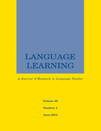
LANGUAGE LEARNING
Advancing the frontiers of language acquisition.LANGUAGE LEARNING is a premier academic journal dedicated to advancing the field of language acquisition and education, published by Wiley. With a foundation dating back to 1948, the journal has carved an esteemed niche in the academic landscape, currently holding a prestigious Q1 rank in both the categories of Education and Linguistics and Language. It proudly occupies the 9th percentile rank in the Arts and Humanities domain and the 10th percentile in Social Sciences, illustrating its influence and reach. The journal publishes high-quality research that explores various dimensions of language learning, from cognitive processes to pedagogical approaches, making it an essential resource for researchers, educators, and students alike. Although Access options are non-open, the journal remains accessible to a wide audience, reinforcing its commitment to disseminating critical insights within the academic community.
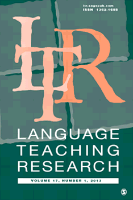
Language Teaching Research
Advancing the frontiers of language education.Language Teaching Research, published by SAGE Publications Ltd, serves as a pivotal platform for scholars and practitioners in the domains of education and linguistics. Since its inception in 1997, this prestigious journal has maintained its status within the Q1 category for both Education and Linguistics, symbolizing its significant impact and commitment to excellence in research. With impressive Scopus rankings placing it among the top percentile in its fields, Language Teaching Research provides a comprehensive array of articles, studies, and reviews dedicated to advancing the theory and practice of language education. Although currently not an Open Access journal, it remains essential reading for those engaged in the evolving challenges and methodologies surrounding language teaching and learning. The journal aims to foster insightful discussions and disseminate innovative research findings, making it a crucial resource for educators, researchers, and students keen on enhancing language acquisition and pedagogical strategies.

Porta Linguarum
Innovating language studies to enhance pedagogical practices.Porta Linguarum, published by UNIV GRANADA in Spain, is a pioneering journal dedicated to the fields of linguistics and language studies, with a dual focus on the educational implications and applications within these disciplines. Launched in 2008 and continuing its impactful contributions into 2024, the journal is recognized for its rigorous peer-reviewed articles that address contemporary language issues, pedagogical approaches, and linguistic research, evidenced by its notable rankings in the 2023 Scopus metrics. Porta Linguarum holds a distinguished Q1 classification in Linguistics and Language, alongside a respectable Q3 placement in Education, marking it as a valuable resource for academics and practitioners alike. With an impressive ranking of 231 out of 1088 in the Arts and Humanities category and a strong 78th percentile ranking for Language and Linguistics, this journal facilitates the exchange of innovative ideas and promotes scholarly discourse. Although currently not adopting an open access model, it remains an essential platform for advancing knowledge in linguistics and education.

Taiwan Journal of TESOL
Bridging Cultures through Language ResearchTaiwan Journal of TESOL, published by CRANE PUBL CO, serves as a vital platform for research in the fields of Education and Linguistics. Established to advance the field of Teaching English to Speakers of Other Languages, this journal provides a diverse range of scholarly articles aimed at enhancing pedagogical practices, understanding language acquisition, and facilitating cross-cultural communication. With a convergence of research years from 2017 to 2024, it proudly holds its position within the quartile rankings of Q4 in Education and Q2 in Linguistics and Language. The journal’s Scopus ranks notably place it in the 61st percentile for Language and Linguistics among Arts and Humanities, making it a respected resource for both seasoned scholars and emerging researchers. While it currently does not offer open access, the journal remains committed to making its contributions available to the academic community. The ISSN numbers are 1814-9448 and 2076-7617 for print and electronic formats, respectively, ensuring accessibility to a global audience. As a leading publication within its domain, the Taiwan Journal of TESOL invites submission of innovative research that shapes the future of language education.

FOREIGN LANGUAGE ANNALS
Elevating Standards in Language PedagogyForeign Language Annals is a prestigious academic journal published by Wiley, dedicated to advancing the field of linguistics and language studies. Since its inception in 1967, the journal has established itself as a vital resource for researchers, professionals, and students interested in the evolving dynamics of foreign language education and acquisition. With an impressive impact factor that places it in the Q1 category for Linguistics and Language in 2023, Foreign Language Annals ranks 48th out of 1167 journals in its domain, showcasing its influence and reach within the scientific community. Through a diverse range of scholarly articles and research findings, the journal aims to foster innovation and best practices in language instruction and pedagogy. Although not open access, it remains accessible to a broad readership, offering invaluable insights for those striving to improve language education and understanding across cultures.
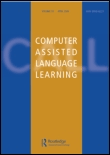
Computer Assisted Language Learning
Empowering Language Learners with Digital ToolsComputer Assisted Language Learning is a prestigious journal dedicated to the interdisciplinary field of language education technology, published by Routledge Journals, Taylor & Francis Ltd. With its ISSN 0958-8221 and E-ISSN 1744-3210, the journal has become a cornerstone for researchers and practitioners interested in the innovative integration of computer technology in language learning processes. As of 2023, it holds an impressive impact factor, ranking Q1 in both Computer Science Applications and Linguistics and Language categories, indicating its significance within these scholarly domains. The journal covers a wide array of subjects, including language acquisition, educational technology, and instructional design, facilitating an understanding of how digital tools can enhance language learning experiences. Its rigorous editorial standards ensure that published articles undergo thorough peer review, making it a highly respected platform for disseminating cutting-edge research. With an extensive publication history dating back to 1990 and an ongoing commitment to exploring the dynamics of language learning in digital contexts, this journal is essential for academics, educators, and students alike who are looking to stay at the forefront of research in computer-assisted language education.
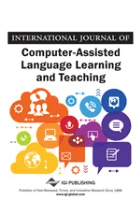
International Journal of Computer-Assisted Language Learning and Teaching
Shaping the future of language teaching with innovative practices.Welcome to the International Journal of Computer-Assisted Language Learning and Teaching, a premier publication by IGI Global dedicated to advancing the interdisciplinary research at the intersection of linguistics, education, and computer science. With an ISSN of 2155-7098 and an E-ISSN of 2155-7101, this journal aims to provide a platform for innovative studies on the implementation and effectiveness of technology in language learning and teaching. The journal has earned notable recognition within its field, securing a Q1 ranking in Linguistics and Language and strong placements across several categories in the 2023 Scopus Ranks, including a Q3 classification in Computer Science Applications and Computer Vision and Pattern Recognition. Researchers and educators are encouraged to contribute their findings to foster dialogue around effective computer-assisted methodologies and instructional practices. Although the journal is not open access, it remains a vital resource for researchers, professionals, and students seeking to enhance the efficacy of language education through technological innovation.

CALICO Journal
Innovating Pedagogy at the Intersection of Language and Tech.CALICO Journal, published by EQUINOX PUBLISHING LTD, stands at the forefront of research in the intersection of technology and language education. With a prestigious history that spans from 1983 to 2024, this journal has been pivotal in advancing the field, earning high rankings in multiple categories, including Q1 in Education and Linguistics and Language, as well as Q2 in Computer Science Applications. Researchers and educators alike benefit from its wealth of articles that delve into innovative pedagogical strategies, the application of technology in language learning, and the exploration of linguistic theories. Although the journal is not currently open access, its impactful contributions are widely recognized, as evidenced by its strong Scopus rankings, placing it in the 88th percentile for Language and Linguistics. CALICO Journal remains an essential resource for those looking to enhance their practice and expand their knowledge in the dynamic fields of language learning and technology integration.
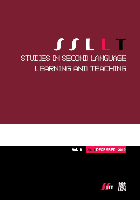
Studies in Second Language Learning and Teaching
Championing open access for global language scholarship.Studies in Second Language Learning and Teaching is a premier open-access journal dedicated to advancing research and scholarship in the fields of education, linguistics, and language acquisition. Published by ADAM MICKIEWICZ UNIVERSITY, KALISZ, this journal has consistently achieved high acclaim, reflected in its impressive Q1 rankings in both Education and Linguistics and Language categories for 2023. With a robust focus on innovative methods, effective pedagogical strategies, and interdisciplinary approaches, Studies in Second Language Learning and Teaching aims to facilitate dialogue among researchers, educators, and practitioners, fostering a deeper understanding of language learning and teaching in diverse contexts. Since its transition to open access in 2011, the journal has expanded its reach, providing valuable resources and research findings to a global audience. With an exceptional Scopus ranking placing it in the top percentiles across multiple categories, this journal stands as a crucial platform for the dissemination of ground-breaking research in second language education.
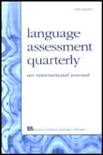
Language Assessment Quarterly
Exploring New Horizons in Language EvaluationLanguage Assessment Quarterly, published by Routledge Journals, Taylor & Francis Ltd, is a preeminent journal within the field of linguistics and language assessment. Established in 2009, the journal has swiftly ascended to the Q1 category in Linguistics and Language, attesting to its significant impact and reputation within the academic community. With a Scopus rank placing it in the top 4% of journals in both Arts and Humanities and Social Sciences, it serves as an essential platform for researchers, educators, and students dedicated to advancing the field of language assessment. Language Assessment Quarterly provides a rich repository of peer-reviewed articles that encompass innovative research, theoretical frameworks, and practical applications, making it indispensable for those aiming to explore and contribute to the evolving landscape of language evaluation. The journal strives to disseminate knowledge that not only enhances academic inquiry but also informs effective policy and practice in language assessment worldwide.